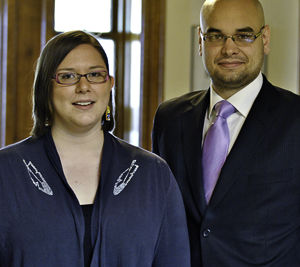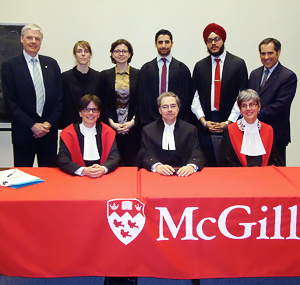More on the Faculty’s achievements at this year’s moot competitions
The Kawaskhimon Moot
When law students Joseph Flowers and Charlotte Burns travelled to Vancouver for the Kawaskhimon Moot in March, their task was two-fold: suggest legal strategies that their client, the Native Women’s Association of Canada, could adopt and second, propose new terms of reference for a public inquiry into missing and murdered indigenous women and girls.
In reflecting on the experience, however, both Burns and Flowers agree that the events of the moot prompted insights far beyond the technical details of the case itself.

For one thing, the negotiation process of establishing new terms of reference for the public inquiry was complex but rewarding, says Burns. “There were about 65 students representing 17 different parties [and this] required us to think about how to build consensus while incorporating indigenous processes,” she explains, adding that because the moot was non-competitive, it allowed participants to develop a variety of advocacy skills “in a safe and supportive environment without the anxiety of competition.”
This is not to say the moot was not stressful, Flowers notes. “What I took away from it is how messy things can be when you’re trying to work with so many people with so many different interests. I think every school did a good job of representing their clients’ interests, which really brought out all those differences.”
“What is most striking was how emotional the experience was for me,” Burns adds, reflecting on the cases of missing and murdered women. “As I read all of the women’s stories, I thought about all the beauty and promise they offered the world and about the children and families they left behind. I thought about how she could have been my sister, my mother, my daughter or any other woman in my life that I care about.”
The students discussed how to engage different indigenous legal systems in the case, but they also got to see an alternative approach to dispute resolution in action when they took part in a Coast Salish reconciliation ceremony.
“The Coast Salish people on whose territory we were at the time* held this ceremony because of a misunderstanding between the organizers and one of the organizations that was represented by the students,” Flowers said. “We actually took part in that and that’s one thing you would probably not get if you took part in a competitive moot anywhere else! … It’s a whole other exercise in transsystemia.”
* The city of Montreal sits on Haudenosaunee (Iroquois) territory, as does the city of Toronto, while the city of Vancouver sits on Coast Salish territory.
Also in March:

Bar Prize Moot: McGill hosted the Bar Prize Moot in which four students, Marie-Ève Lavoie, Silvia Dimitrova, Jagtaran Singh and Omar Soliman, competed pleading last year’s Laskin factum. The judges were Pierre Dalphond from the Quebec Court of Appeal, and Chantal Corriveau and Pepita Capriolo, both judges of the Superior Court of Quebec. Jagtaran Singh won Best Pleader and Silvia Dimitrova won second best pleader while the prize for the best team was split equally among the participants.
Jessup International Moot: The McGill Jessup team had an excellent performance at the Canadian Rounds of the Jessup International Moot Court Competition, held this year in Calgary. The team members, consisting of Timothy Bottomer, Jonathan Katz, Ishat Reza and Eva Warden, placed third overall, (Canadian National Championship Team – Bronze Rank, Donat Pharand Award). In addition, Eva Warden and Ishat Reza won best applicant memorial. Warden and Reza also won best applicant team for combined oral and memorial scores. Eva Warden placed among the top ten oralists.
The team also competed in the exhibition round of the Jessup Finals in Washington DC.
Sarin Leiden International Air Law Moot: McGill took first place in the 2011 Sarin Leiden International Air Law Moot Court Competition held March 12-15, 2011, in Dubai, United Arab Emirates. Auguste Hocking (Australia), Joseph Wheeler (Australia) and Mithun Pemmaiah (India) are all graduate students at the McGill Institute of Air & Space Law. They were coached by DCL candidate, Paul FitzGerald (Canada). The McGill team also placed first in oral argument for both the Applicant’s and Respondent’s side of the competition. The problem addressed issues of aviation safety in light of a volcanic eruption, emissions charges, traffic rights, cabotage and foreign ownership and control.
